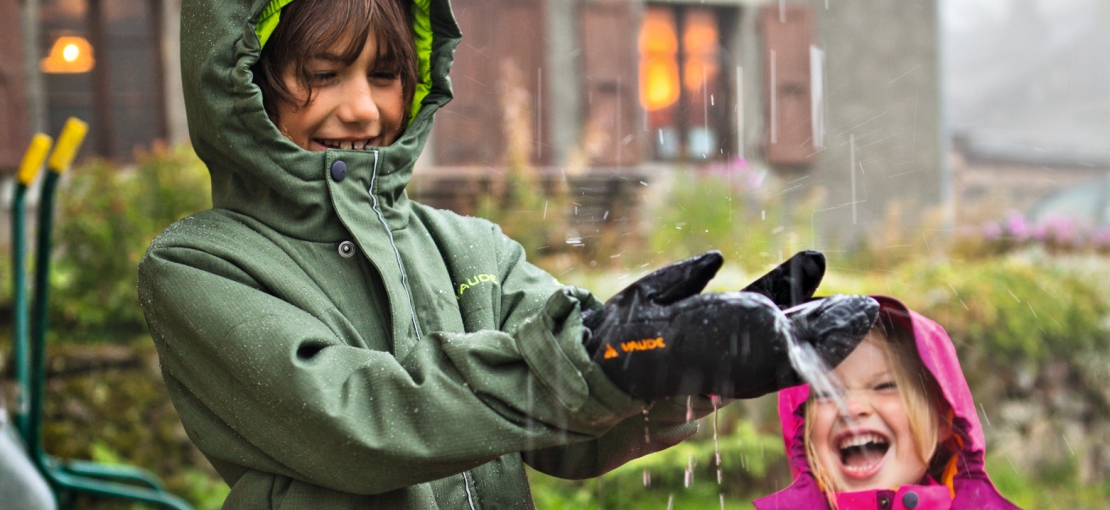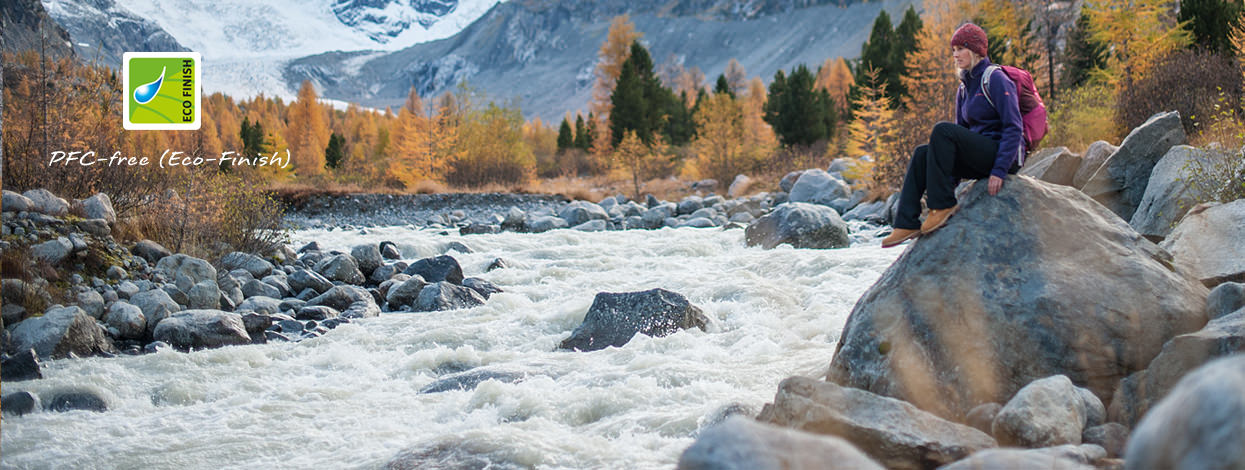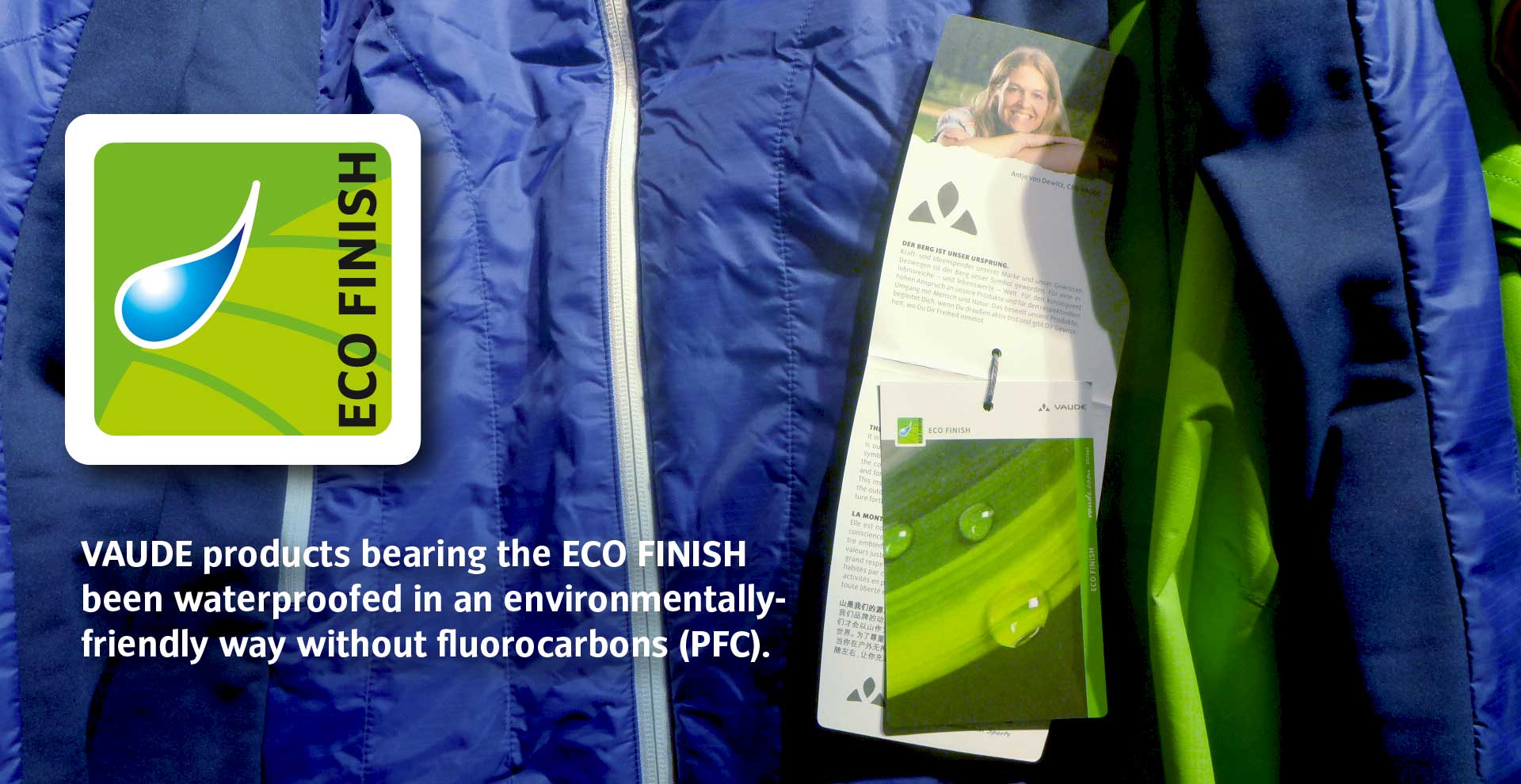
Complete phase-out of PFCs by 2020
Increasing awareness of problems and solutions
The development of eco-friendly alternatives will only be accelerated when ongoing awareness and focus is put onto this issue, because we as a manufacturer have to rely on the supply chain. VAUDE is taking this issue very seriously and already has many PFC-free water repellent products. VAUDE has voluntarily agreed to become fully PFC-free across the entire collection no later than 2020.
If you want to be sure to avoid PFCs when purchasing our products, pay attention to the Eco-Finish label. An overview of all water-repellent products with Eco-Finish can be found here.

The following FAQs will provide you with answers to key questions regarding the issue of fluorocarbons. Find out what to watch out for when purchasing outdoor products and what VAUDE has planned for its transition away from the use of PFCs.
Full transparency regarding our transition to PFC-free products can be found in addition here.
The most important questions about PFCs:
Good outdoor clothing must be water and dirt repellent to provide the necessary protection in all weather conditions. To achieve this functionality, chemical substances are used. Poly- and perfluorinated chemicals (PFCs) play an important role in the manufacturing of outdoor gear.
Direct comparison test of two different waterproof Altiplano jackets after 10 minutes of water spray:
Photo left: Waterproofing/DWR with PFC (C6) and good water beading effect.
Photo right: PFC-free waterproofing/DWR, which allows the jacket to fully absorb water.

What are PFCs and where are they used?
PFC is an abbreviation for per-and polyfluorinated chemicals. This is a group of substances that have water- oil- and dirt-repellent properties. They are employed in the manufacture of many products used in everyday life, such as non-stick frying pans, fire fighting foam, home textiles (carpets) as well as functional textiles. The outdoor industry, however, is only responsible for a small fraction of the PFCs released over the world.
How and why are PFCs used in outdoor gear?
- The jacket is given a membrane that functions like a thin skin incorporated between fabric layers. This membrane blocks water but at the same time, is breathable. There are membranes that require PFC in their production. VAUDE, however, only uses membranes that do not require the use of PFCs.
- Another application is DWR (Durable Water Repellency). With this chemical finish, textile surfaces are given a permanent finish which ensures that water and dirt bead up on the product’s exterior. Without this treatment, the outer fabric would quickly become soaked through, which leads to a clammy, wet feeling despite the jacket’s membrane.
Why are PFCs viewed critically?
When purchasing outdoor products, what should I watch out for when I want to avoid the use of PFCs?
- It is important that every customer, with the help of expert advice, chooses a product with the functionality needed for his or her purpose. That might mean that instead of buying a waterproof jacket, a water-repellent jacket is preferable.
- If you want to purchase a water repellent product that has been made with environmentally friendly manufacturing and without the use of PFCs, look for VAUDE’s Eco-Finish label. The Eco-Finish symbol guarantees PFC-free production paired with the standard first class functionality that you expect from VAUDE gear. Of course, all non-waterproof VAUDE products are also PFC free, for example base layers, fleece jackets, shirts and non-waterproofed pants.
You can find an overview of VAUDE products with Eco-Finish here.

What has VAUDE achieved so far in its transition away from the use of PFCs and where are PFCs still used?
- Since 2010, VAUDE has used PTFE-free membranes (Polytetrafluoroethylene) exclusively which require no PFC for their production. With the Sympatex® membrane from polyetheresther (PE) and our in-house Ceplex membrane made of polyurethane (PU), VAUDE provides PTFE-free alternatives with superior functionality.
- Beginning with the Summer Collection 2015, all water-repellent apparel, such as softshells, wind jackets or thermal jackets have featured PFC-free DWR. These are marked with the Eco-Finish symbol. The Eco-Finish symbol: our guarantee for PFC waterproofing
- In our waterproof apparel, we are largely still using PFC in our DWR to achieve standard water beading properties. Since 2014, however, our DWR has been completely PFOA-free (PFOA stands for perfluorooctanoic acid, an additive for the manufacture of waterproof membranes which is suspected to be carcinogenic); instead of using C8 chemicals we use less problematic C6 chemicals.
- An example of one of our first successes with waterproof clothing is the Segovia Coat. It uses the fully PFC-free Eco-Finish.
- We are working hard with our material manufacturers toward the complete withdrawal from PFC use, and have voluntarily made a commitment to becoming 100% PFC-free throughout the entire collection by 2020.

More questions?
Further information on the issue of PFC and VAUDE’s commitment to environmentally friendly products can be found here.




